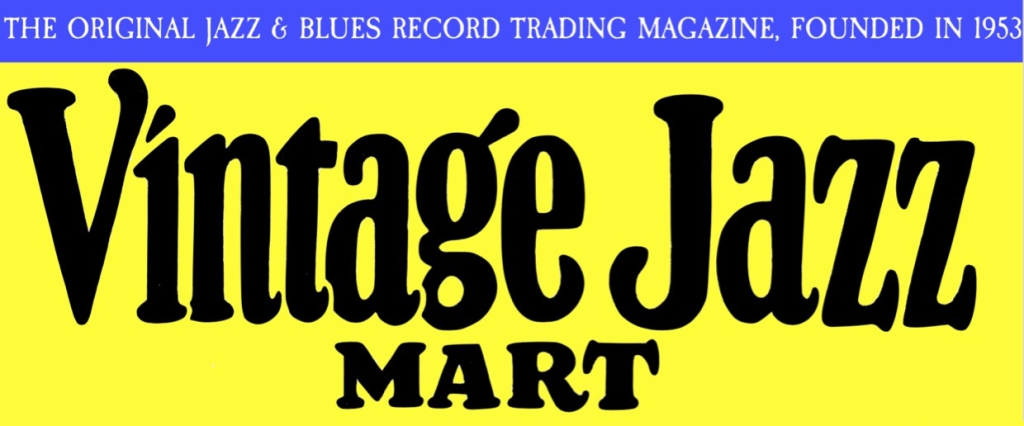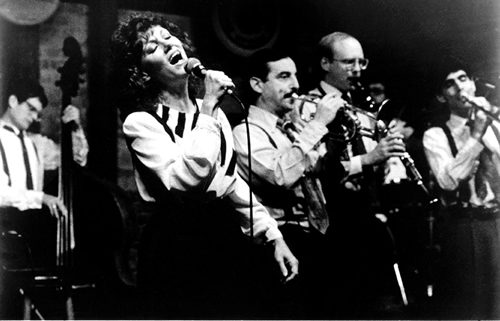
and . . .

I will turn things over to my friend David Sager, Prince of Wails as trombonist and scholar, to share his unusual discovery with you.
An Honored but Tromboneless Guest
Among the storied gathering spots for jazz musicians was the Evanston, Illinois home of Edwin “Squirrel” Ashcraft, a talented amateur pianist turned lawyer. Between 1930 and the start of WWII, Squirrel’s home was the Midwest rallying spot for musicians traveling through the Chicago area, where they could play music as they wished, eat, drink, listen to records, and swap stories.
Known as “Sessions at Squirrel’s,” these gatherings of jazz musicians and record collectors were co-hosted by Bill Priestley, who played cornet and guitar, and like Squirrel, had been a member of the old Princeton Triangle Club Jazz Band back in the 20s. The parties were interrupted by WWII. When they resumed in the 50s, the venue changed to Bill Priestley’s home in Lake Forrest, redubbed as “The Annual Bix Festival,” reflecting the musical allegiance of the hosts and their guests.
And their guests included the likes of Red Nichols, Pee Wee Russell, Joe Rushton, Jimmy McPartland, Eddie Condon, as well as a fairly steady “house band” consisting of Squirrel on piano; Priestley – cornet/guitar; Jack Gardner – piano; George Kenyon – trumpet/mellophone; Phil Atwood – bass; Jack Howe – clarinet, and several other locals.
One of these parties, held on July 4, 1952, coincided with Tommy Dorsey and his Orchestra’s appearance at Chicago’s Edgewater Beach Hotel. Anyone familiar with the book Tommy and Jimmy: the Dorsey Years, by Herb Sanford, will recall the chapter about the party and Dorsey being in attendance. This was during an interval where Tommy Dorsey was battling the sinking popularity of the dance band business. His frustration with the popularity of be-bop, which he called “Communist Jazz,” and the encroachment of rock ‘n roll, was palpable. TD did his best to soldier on, and in many ways was successful. But no matter how hard he tried, he could not bring the band biz back and could not quite recapture his reign over the pop music scene, as it was a decade earlier. His current record contract with Decca Records was also a bust. He complained about Decca’s lack of promotion, “My Decca recordings aren’t released, they escape…if they had put the secret of the atomic bomb on Decca, the Russians would never have got it.”
Thus, Dorsey savored such rare moments of relaxation, and was able to find time that July afternoon to attend, sans trombone. Also, in attendance was chemist, jazz historian, and record producer, John Steiner, who – for the sake of posterity – lugged along his tape recorder. Steiner recorded the day’s jam session, ultimately releasing 8 titles on a on a 10-inch LP on the Steiner-Paramount label and titled “The Third Squirrel.” The brief liner notes to that LP tell us that at one point,
An honored but tromboneless guest arrived. A horn was quickly located. Bang went the band into a warmup blues titled understandably TD’s Dt’s. (sic) It was followed after a few anecdotes with Baby Won’t You Please.
As Herb Sanford tells it, another attendee, Park Burgess, who was headmaster of the Lake Forrest Country Day School, had brought his trombone, which he gladly handed over to TD to play. Dorsey, after playing the horn, thanked Burgess with, “This is a great horn, Park. What do you use on the slide—muselage?” (sic) [mucilage].
Sanford, who had been the Triangle band’s pianist and later, Dorsey’s radio producer, continued,
Tommy was the big hit of the afternoon—not on trombone, but as storyteller. He began to reminisce. One anecdote followed another, going from speakeasy days right on through to the present. Listening to the tape, it is as if Tommy was in the room, with all his idiosyncrasies of speech. Tommy had a way of making a mirthful sound in his throat and sustaining it in the pauses. It had the effect of keeping the listener hanging on.
It may come as a surprise that Dorsey was such an engaging raconteur. His legacy is largely that of an intense taskmaster, often unreasonable and even cruel, as well as unpredictably temperamental. A sort of generalization has come down to us characterizing Tommy as the Dorsey to fear, while brother Jimmy was a sweet gentle soul, loved by all. However, looking a little deeper, we see that it was not an accurate characterization. Jimmy was shy, an introvert. He rarely displayed his temper, but rather kept it on the inside. He was a bit of a misanthrope.
Tommy, on the other hand, was a people person; gregarious, generous, energetic. But he also exhibited symptoms of being bipolar. He was volatile and intolerant with those he considered weak. But surrounded by his friends, he was convivial, gracious, and very funny.
The tape referred to in the Sanford book had long intrigued me. There are plenty of recordings of TD speaking to an audience, in an amiable, ever-so-slightly gruff manner. Yet, there are next to no recorded interviews, or even written records of his reminiscences or opinions – at least not ones that are not heavily ghosted by an editor. Therefore, we have almost no first-hand accounts from this seminal figure of American popular music.
In the late 1980s, while I was traveling in Milwaukee with Banu Gibson and her band, pianist David Boeddinghaus and I had the pleasure of visiting John Steiner, himself, in his suburban home. Mrs. Steiner served us some lunch, and then John led us to his basement, where he kept his collection.
John’s basement contained the spoils of the Paramount Records business he had acquired years before, when he purchased the name and existing stock of the fabled label. There were test pressings, metal parts, some commercial pressings. There were also lots of audio gadgets: meters, microphones, oscilloscopes, old transcription turntables, tubes…
I asked John about the Dorsey tape and the “Third Squirrel” album. He pulled out a copy of the latter, a 10-inch LP, pressed on transparent red vinyl, which he presented to me. John then foraged around through his collection of open-reel tapes and found the one of Tommy as life of the party. At least, it was part of the complete tape; a few of the stories Sanford reported are not present. And, in their place are some that were new to me. I suspect that there is another reel somewhere in John’s collection, now housed at the University of Chicago. Anyway, John played us the tape, or what he could find of it. It was as good as Sanford said. I asked John for a copy and a week or two later a package arrived at my door containing a cassette, the contents of which I present here.
Sanford transcribed several of these stories for his book. They are slightly amusing. However, one really misses the impact of Tommy’s speech – you really had to be there. Hearing the actual recording, we experience Dorsey, the engaging raconteur, complete with expertly timed pauses and punchlines. This is most evident in the story about the Everglades and its very funny tag line.
The stories take us back to the days of Plunkett’s speakeasy, the most storied watering hole in the annals of 1920s hot jazz. And yes, the anecdotes are dominated by the theme of drinking – to excess – and the results of musicians so influenced performing in high-class establishments.
We hear about Davey Tough and Tommy’s attempt to help him dry out. Also, a projectile string bass and the mobster who defended the perpetrator. Then there’s a story about an unusual main dish that will surely offend many. To Tommy’s credit, he did not bring this one up. Rather it was Squirrel who mentioned it. It concerns an obscure Philadelphia musician named Ralph Margavero (I am not sure about that spelling). I did check Philadelphia newspapers and Ancestery.com and could not find out anything about him. But it seems that, like so many working musicians, Ralph would come home late after a gig hungry. Ah, the antics of musicians who will stop at nothing! Fortunately, I think, we have all evolved since then…
Additionally, many of the asides are worth picking through the excess crowd noise to hear. For instance, Tommy mentions a notorious New York hoodlum, who was also the manager of Tommy Guinan’s Playground; Hyman “Feet” Edson. Squirrel offers up a story – barely audible, about Wingy Manone. But then, Tommy chimes in and confirms the urban myth about brother Jimmy sending Wingy one cufflink for his birthday.
Those who own the Sanford book, will notice some discrepancies between Sanford’s transcription and what Dorsey actually says on the tape. For instance, the story about Charlie Shavers will now make some sense. There is one casualty; the story about Pee Wee Russell, which Sanford saved for last, is missing. If the full tape exists perhaps some diligent researcher will someday find it in the Steiner Collection.
The final story on the tape reflects TD‘s distaste for bebop. Obscured by the crowd noise, he begins, “I don’t go in much for bop stories…
A bopper walking down the street, and he’s in cloud number 7, and there’s an organ grinder there, and he’s playing a tune, and the monkey’s right on the… organ grinder, ya know, the organ…and the guy looked up and said, “Man, I don’t dig your music, but you got a crazy son!”
As a finale, here is the one issued jam session title, “TD’s Dt’s,” on which Dorsey is heard playing three choruses of blues on a borrowed trombone, and a tremendous performance, at that. There has been so much in print about Dorsey’s lack of ability when it came to playing jazz, I find it maddening. It’s true that Tommy, in his jazz playing, stuck close to the melody, varying it in predictable ways, with a repertoire of about a dozen pet licks. But here, during those three choruses, I don’t hear even one of his usual “go-to phrases.” Although dominated by a huge ego, Tommy Dorsey was modest, even embarrassed by his jazz playing. That was not necessary, for despite a narrow harmonic imagination, his attack, forcefulness, and musical conviction were more convincing and compelling than most.
Here’s the too-brief blues (its sound improved, thanks to Doug Benson and Karl Pierson).
and the stories:
Thanks to David Sager for his typically perceptive diligence and generosity.
May your happiness increase!























